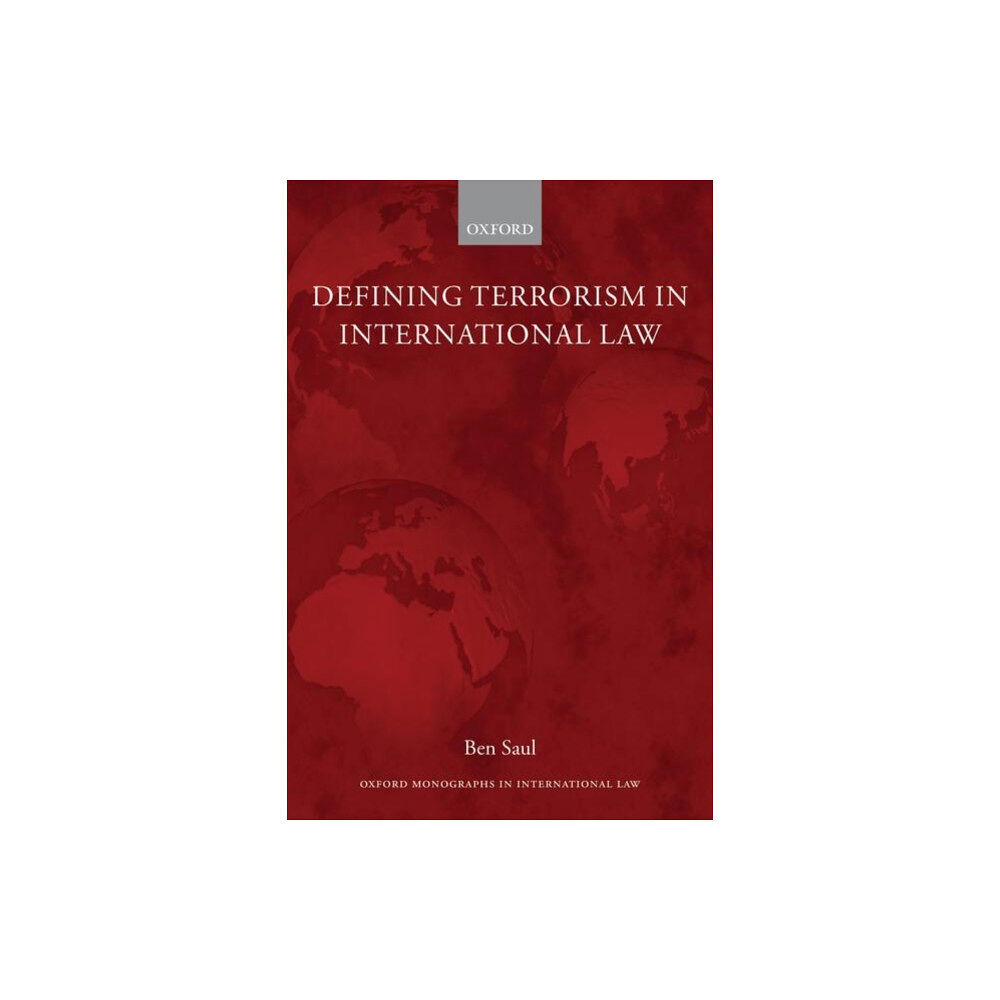- Hem
- Böcker
- Kurslitteratur
- Samhälle & Politik
- Defining Terrorism in International Law (häftad, eng)

Defining Terrorism in International Law (häftad, eng)
Despite numerous efforts since the 1920s, the international community has failed to define or criminalize ''terrorism'' in international law...
979 kr
1 025 kr
Slut i lager
- Fri frakt
Fri frakt över 299:-
Snabb leverans
Alltid låga priser
Produktbeskrivning
Despite numerous efforts since the 1920s, the international community has failed to define or criminalize ''terrorism'' in international law. This book first explores the policy reasons for defining and criminalizing terrorism, before proposing the basic elements of an international definition.
Terrorism should be defined and criminalized because it seriously undermines fundamental human rights, jeopardizes the State and peaceful politics, and may threaten international peace and security. Definition would also help to distinguish political from private violence, eliminating the overreach of the many ''sectoral'' anti-terrorism treaties.
A definition may also help to confine the scope of UN Security Council resolutions since 11 September 2001, which have encouraged States to pursue unilateral and excessive counter-terrorism measures.Defining terrorism as a discrete international crime normatively recognizes and protects vital international community values and interests, symbolically expresses community condemnation, and stigmatizes offenders.
Any definition of terrorism must also accommodate reasonable claims to political violence, particularly against repressive governments, and this book examines the range of exceptions, justifications, excuses, defences, and amnesties potentially available to terrorists, as well as purported exceptions such as self-determination struggles, ''State terrorism'', and armed conflicts.While this book seeks to minimize recourse to violence, it recognises that international law should not become complicit in oppression by criminalizing legitimate forms of political resistance.
In the absence of an international definition, the remainder of the book explores how the international community has responded to terrorism in international and ''regional'' treaties, the United Nations system, and in customary law. The final part of the book explores the distinctive prohibitions and crime of ''terrorism'' in armed conflict under international humanitarian law.
Terrorism should be defined and criminalized because it seriously undermines fundamental human rights, jeopardizes the State and peaceful politics, and may threaten international peace and security. Definition would also help to distinguish political from private violence, eliminating the overreach of the many ''sectoral'' anti-terrorism treaties.
A definition may also help to confine the scope of UN Security Council resolutions since 11 September 2001, which have encouraged States to pursue unilateral and excessive counter-terrorism measures.Defining terrorism as a discrete international crime normatively recognizes and protects vital international community values and interests, symbolically expresses community condemnation, and stigmatizes offenders.
Any definition of terrorism must also accommodate reasonable claims to political violence, particularly against repressive governments, and this book examines the range of exceptions, justifications, excuses, defences, and amnesties potentially available to terrorists, as well as purported exceptions such as self-determination struggles, ''State terrorism'', and armed conflicts.While this book seeks to minimize recourse to violence, it recognises that international law should not become complicit in oppression by criminalizing legitimate forms of political resistance.
In the absence of an international definition, the remainder of the book explores how the international community has responded to terrorism in international and ''regional'' treaties, the United Nations system, and in customary law. The final part of the book explores the distinctive prohibitions and crime of ''terrorism'' in armed conflict under international humanitarian law.
| Format | Häftad |
| Omfång | 416 sidor |
| Språk | Engelska |
| Förlag | Oxford University Press |
| Utgivningsdatum | 2008-02-14 |
| ISBN | 9780199535477 |
Specifikation
Böcker
- Häftad, 416, Engelska, Oxford University Press, 2008-02-14, 9780199535477
Leverans
Vi erbjuder flera smidiga leveransalternativ beroende på ditt postnummer, såsom Budbee Box, Early Bird, Instabox och DB Schenker. Vid köp över 299 kr är leveransen kostnadsfri, annars tillkommer en fraktavgift från 29 kr. Välj det alternativ som passar dig bäst för en bekväm leverans.
Betalning
Du kan betala tryggt och enkelt via Avarda med flera alternativ: Swish för snabb betalning, kortbetalning med VISA eller MasterCard, faktura med 30 dagars betalningstid, eller konto för flexibel delbetalning.
Specifikation
Böcker
- Format Häftad
- Antal sidor 416
- Språk Engelska
- Förlag Oxford University Press
- Utgivningsdatum 2008-02-14
- ISBN 9780199535477
